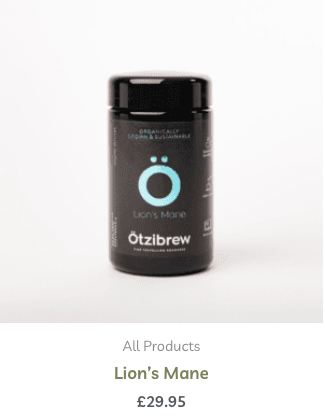
Lion’s Mane: Everything You Need to Know About the Surprising Medicinal Mushroom and 5 Benefits
Lion’s Mane, an ancient tonic used for brain health and focus, is a widely known medicinal mushroom named after its shaggy, white appearance of a lion’s mane. In this article, we’ll explore everything you need to know about the unique mushroom, including its benefits and how you can start incorporating it into your own diet.
What is Lion’s Mane?
This mushroom is a nootropic and an adaptogen used for centuries in traditional Chinese medicine as a plant which promotes longevity, vitality and overall health. Buddhist monks have been said to drink lion’s mane tea to enhance their brain focus and concentration during meditation.
5 Lion’s Mane Benefits
In recent years, irrefutable research backs claims on how it improves our health and the most in-depth research on the benefits of lion’s mane focuses on its benefits to cognitive function. Check out the five benefits of this fungi below.
1. Improved memory
Learning and memory deficient mice were fed a diet containing lion’s mane after being administered amyloid peptide – the same amyloid beta-plagues which appear in the brain during Alzheimer’s disease – and the results were studied through Y-maze tests and novel-object recognition testing.
The results showed prevention of neuronal damage and of impairment to spatial short-term and visual recognition memory, otherwise induced by the amyloid peptide, and indicates a use in the deterrence of cognitive dysfunction.
2. Brain health
In an absence of NGF, Alzheimer’s symptoms have been studied in the brains of mice.
3. Digestive health
The mushroom was tested on rodents who were given an extract to compare against the effects of anti-ulcer medication. The results showed a significant reduction in the ulcer area which was exposed to the lion’s mane extract, causing researchers to speculate that the bioactive compounds present offer gastroprotective effects.
Accumulating evidence on lion’s mane and the digestive tract suggests it has anti-inflammatory properties which can protect against intestinal damage, particularly in how it may help treat inflammatory bowel diseases, like Crohn’s and ulcerative colitis.
4. Heart Health
5. Mood boosting
Another study conducted on a small sample of older women found lion’s mane reduced the symptoms of depression and anxiety associated with menopause. Two groups were given cookies to eat daily over a four-week period – one group were given cookies as a placebo and the other ate cookies infused with lion’s mane. The latter group reported a lower feeling of irritability and anxiety.
Similar to chaga, consumption of lion’s mane can help to fight free radicals in the body by offering protection from a high volume of antioxidants. Taken together, they work in synergy to enhance the body’s defence systems and support neural pathways.
Lion’s Mane UK
Otzibrew is a U.K. supplier of organic lion’s mane. Our product can be added to hot or cold drinks, used in cooking or sprinkled over food that is preferably bioactive. Click here to buy.

How to Take It?
This type of medicinal mushroom is known for its potential cognitive and neurological benefits. It can be consumed in various forms, and the method of intake often depends on personal preferences and the intended use. Here are some common ways to consume it.
Tea and coffee
- Preparation: Use dried lion’s mane mushroom or powder. Add about 1-2 teaspoons to a cup of boiling water. Let it steep for 5-10 minutes, then strain.
- Consumption: Drink the tea as you would any herbal tea. You can add honey or other sweeteners for flavour if desired. we recommend a dosage of up to 5g per day.
Powder
- Consumption: The powdered form can be added to smoothies, juices, or even sprinkled on food. Some people also use it as an ingredient in cooking or baking, and it works particularly well when paired with yoghurt.
Lion’s mane can be consumed in various forms, from teas and tinctures to capsules and fresh preparations. Choose the method that best suits your preferences and needs. Always source products from reputable suppliers to ensure quality and purity.
Lion’s Mane Side Effects
Lion’s Mane is generally consider safe to consume, but there are some potential side effects you should be aware of before incorporating it into your diet.
- Dosage: Always start with a smaller dose to see how your body reacts and then adjust accordingly. If using a commercial product, follow the recommended dosage on the label.
- Allergies: As with any supplement or food, there’s a potential for allergic reactions. Start with a small amount to see how your body reacts.
- Medication Interactions: While lion’s mane is generally considered safe, it’s always a good idea to consult with a healthcare professional, especially if you’re on medication or have underlying health conditions.
- Pregnancy and Breastfeeding: There’s limited research on the safety of this edible mushroom during pregnancy and breastfeeding. It’s advisable to consult with a healthcare provider before use.
See More
If you’re interested in discovering more natural-based products, visit our shop.

